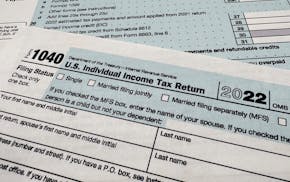Long-simmering tensions in St. Paul schools have increasingly led to disruptions and violence on several campuses even as teachers rang the alarm bells to lackluster response. That's the message parents, educators and students sent to the school board during a community meeting on campus safety held weeks after events roiled some of the district's high schools.
Joyce Jones Strait, who teaches science at Washington Technology Magnet School, said students regularly use their cellphones to coordinate fights and at times to broadcast them over social media.
At Hidden River Middle School, Emma Stalker has seen students bring weapons to class. Some pupils throw objects in class "hard enough to cause serious injury."
Violence has become so normalized at Como Park High, freshman Nafiso Ahmed said, that "At this point, when you see someone with a knife or a gun, it doesn't surprise me."
More than 60 people addressed the board during the listening session Tuesday night at Washington Tech. The school district's teachers union had been pressing for the board to call an emergency meeting since shortly after 15-year-old Devin Denelle Edward Scott was fatally stabbed at Harding High in early February.
Three St. Paul high schools, including Washington Tech, also went into lockdown in the weeks leading up to the stabbing in response to separate shootings near their campuses. Parents, students and district staff offered up several ideas for dealing with the violence that's roiled the state's second-largest district.
Chief among those suggestions was that St. Paul schools invest in more mental health resources for students, including more counselors and social workers. Errol Edwards, a school counselor for third-, fourth- and fifth-graders at Obama Elementary, said he's seen more kids exhibit anxiety this year than ever before.
"Our scholars' families, their caregivers are hurting," he said. "Enough is enough. We need real change."
Educators say students didn't develop the skills they need to mediate interpersonal conflict when they were suddenly thrust into remote learning at the beginning of the pandemic. Charles Richards, a fourth-grade teacher at St. Paul Music Academy, said kids are instead predisposed to "clap back" and escalate conflict when they feel slighted.
"At school, our students are saying they need to defend themselves," he said.
Several educators and parents suggested the district develop campus safety plans for each school with input from staff, faculty and students.
"What is needed here is not necessarily what is needed at Highland Park," said David Palm, an attorney for the St. Paul Public Housing Agency whose children attend district schools.
While those assembled offered a range of solutions for campus safety, the majority of speakers voiced strong opposition to stationing armed police officers in schools.
Reier Erickson has two children in the district. He grew up in International Falls, Minn., and recently moved his family to St. Paul from St. Albans, Vt., where he spent years advocating for the removal of school resource officers.
"We need to be proactive, not reactive," Erickson said. "St. Paul removed police from schools for a reason, and that reason cannot be ignored."
Still, other parents and educators said campus officers should remain an option in St. Paul schools. Palm asked those in attendance not to vilify police, and Highland Park teacher Nate Giles said some students have had positive interactions with on-campus officers.
"I've seen the relationship that police officers have made with students in St. Paul Public Schools," Giles said.
The input provided during Tuesday's meeting "will help inform potential solutions to improve school safety," board Chair Jim Vue said in a statement.
New Minnesota GOP leaders seek peace with party's anti-establishment wing

Who is Republican Lisa Demuth, Minnesota's first House speaker of color?

Minnesota House GOP, Secretary of State Steve Simon return to Supreme Court
Supreme Court sides with DFL and Simon, says 68 House members needed for floor action
